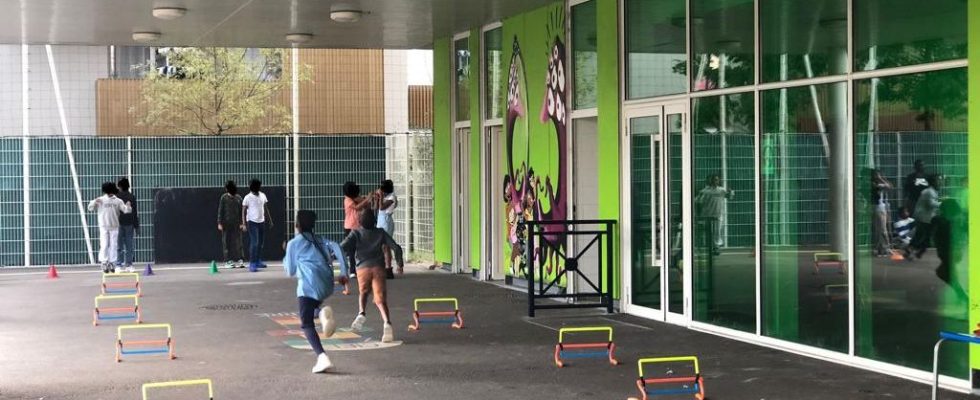This Tuesday morning, laughter and cries of joy evaporate from the courtyard of the Anatole France school in Champigny-sur-Marne (Val-de-Marne). It is not recess, but a 30-minute session of daily physical activity (PDA). This measure was generalized by the Ministry of National Education last year to combat the sedentary lifestyle of students.
In this Rep + rated school, located in the heart of large buildings, two CM1-CM2 classes mix to play basketball, ping-pong, races, relay games… “We work the body and that puts a good atmosphere,” comments Samba, a CM2 student, between two dribbles. “It feels good to do sport. And I love ping-pong,” confides Imane, in CM2. “I love the tic-tac-toe relay,” says Marwan, before running back. Not one child seems to be reluctant to exercise. And everyone seems delighted to alternate between the different activities offered. “They know that we are not aiming for performance, but perseverance. We just want them to move and enjoy it, because there is a big problem of sedentary lifestyle linked to the use of screens, from a very young age,” comments Elsa Ugolini, the school’s director. .
A calmer school climate
Each teacher decides what time they want to schedule their session: “I prefer that they start with this by arriving in the morning at 8:30 a.m. They are more alert and receptive to learning,” explains Céline*, a school teacher who is leading an APQ session this morning, with a smile on her face. It’s also up to everyone to imagine the activities they want to offer. “We can walk in a limited time to go on a school trip, play a dodgeball, a rugby session, or compete for the class who climbs the stairs the fastest and quietly,” explains Elsa Ugolini.
A whistle sounds, the students change activities. They jump, run… None are pushed by a friend, or mocked for their poor performance. “These activities play on group cohesion. The children learn to know themselves better,” comments Manon, CM1-CM2 teacher. “They learn to lose and win, this is felt in the school climate, which is more peaceful,” also notes Aurélie, Rep + coordinator.
Students who are calmer and more focused afterwards
Looking at them, another reality is evident: girls play with boys, contrary to what happens in many establishments, as the literature on single-sex schoolyards has shown. And no activity is put aside by boys because it is the prerogative of girls, or vice versa. “For example, they play with skipping ropes, which was not easy at first,” laughs Elsa Ugolini.
And the teachers are unanimous: these APQs do not waste their time, but allow them to save it: “They have a real effect on the concentration of the students, who are in a better position to tackle the fundamentals”, estimates Manon , teacher in CM1-CM2. What little Imane confirms: “I don’t want to listen to the teacher afterwards. It motivates me,” she admits.
“During this moment, they let go”
These physical activities therefore constitute a real breath of fresh air for these students: “Children who are educated in REP + do not always have access to extracurricular activities. During this moment, they let go.” Recently, the students received a distinguished guest during the APQ: Camille Lutz, talented table tennis player. They were able to exchange a few balls with her. An example of inspiring sporting success for them.
And so that children become even more aware of the importance of moving, teachers lead by example: “We don’t take the school elevator, but the stairs,” says Manon. It even happens that the principal comes to score a few baskets with her students. “It creates a dynamic and it changes our relationships,” she emphasizes, sneakers on her feet. It’s 10 o’clock, the bell rings, it’s time to go back to class. The students go there without flinching, as if they have let off steam enough to move on.
* The first name has been changed

